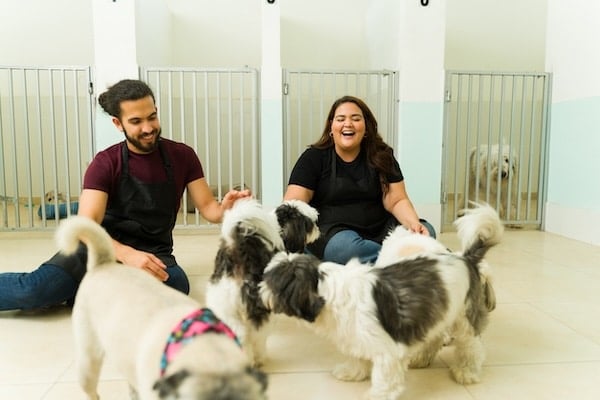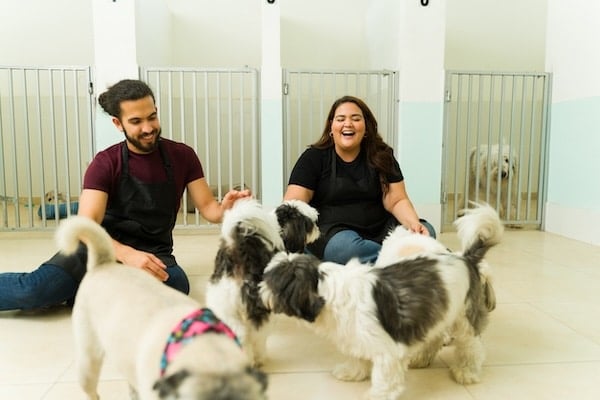
Check out our latest products
- Not a substitute for professional veterinary help.
Dog boarding and dog day care are two different options for getting support with caring for your pup. Many pet sitters and boarding facilities offer both services and have different package options, depending on your needs.
In general, boarding your dog, either at a facility that offers overnight care or in a sitter’s home, is the service for when you’re away from home. Dog day care is when you’re unavailable during the day to exercise or supervise your dog and can sometimes be offered during dog boarding.
Read on to learn more about day care and boarding, with tips to help you make the right choice for both you and your dog.
What’s the Difference Between Dog Day Care and Boarding?
The biggest difference between dog boarding and day care is the timeframe for care. However, the activities and supervision levels can also vary by pet sitter and facility.
| Aspects | Dog boarding | Dog day care |
| Cost | Averages $40 to $50 per night | Averages $40 per day |
| Duration | Overnight or long-term care | Daytime only |
| Supervision | Often includes overnight monitoring and regular check-ins | Constant daytime supervision and group play |
| Purpose | Temporary routine care and socialization for dogs in a safe environment | Stimulation, supervision, and play for dogs during the day |
| Benefit | To maintain a dog’s routine, safety, and care while you’re away | To reduce unwanted or destructive behaviors at home by helping dogs get energy out |
| Environment | Quiet sleeping areas with scheduled potty breaks and playtime | Active, social setting for 6-8 hours with occasional breaks |
| Amenities | May include private sleeping areas, feeding routines, and walks | Play yards and kennels for naps |
| Ideal for | Dogs who need overnight care | Social dogs who enjoy group play and need daytime activity |
Benefits of booking day care and boarding through Rover
Doggy day care through Rover has more care options for different types of dogs and their personalities. Most facilities won’t take reactive or anxious dogs during daycare, but sitters on Rover may. Pet parents can select “Accepts only one client at a time” under the “Pets in home” filter to ensure their dog still gets the daycare they need.
Or you may only be interested a smaller group of dogs, such as two or three pups per setting, which sitters on Rover are more likely to accommodate than a facility. These benefits can also be found when looking for dog boarding on Rover.
When reaching out to a sitter about dog boarding, ask if they include walking, playing, or cuddle time in their fees. Generally, the dog boarding rates on Rover are inclusive of having a personalized schedule or routine. Facilities and kennels, however, often charge more for these services because they have a smaller staff to dog ratio.
Pros of Going to the Same Day Care and Boarding Provider
Finding a day care provider on Rover who also offers boarding can come in handy. An arrangement where your dog knows the place and people can be especially helpful when:
- You need to travel on short notice and need emergency overnight care for your dog.
- You’re taking a long vacation and want your dog to stay somewhere they feel comfortable.
- You want a pet sitter who can accommodate last-minute care needs.
For most dogs, a familiar environment where they know the routine creates less stress. If your dog is already comfortable with their daytime pet sitter, they’ll generally have a much easier time boarding if you need to take a trip.
Keep in mind that some kennels may charge an additional fee if you want your dog to attend day care while boarding. This can depend on the facility, so just be sure to ask first.

Antonio_Diaz via iStock
Matching Your Dog’s Needs to the Care Environment
Every dog is different. Some thrive in a crowd, while others prefer quiet time and a cozy corner.
When trying to find the right dog boarding or day care option, it’s important to consider your dog’s age, health, and personality along with your schedule needs.
Personality: Extrovert vs. introvert
Your dog’s temperament can tell you a lot about what kind of care will help them thrive.
Outgoing dogs may love environments where they can play with other dogs and enjoy plenty of attention. Social dogs generally do well at both day care and boarding, whether with a sitter or at a kennel.
On the other hand, shy or anxious dogs who need boarding or day care may do better in smaller, quieter settings, like a pet sitter’s home. Some pet sitters will even come to your home to care for your dog!
Age: Puppies vs. seniors
Your dog’s age can shape what environment works best for them.
Puppies benefit greatly from interacting and socializing with other dogs. In fact, evidence suggests that properly socialized puppies are less likely to have behavioral problems as adults. Getting dogs used to boarding at an early age may make them easier clients for future sitters, as well.
Senior dogs, on the other hand, may prefer a slower pace with opportunities to rest and nap. A dog boarding facility or sitter without a day care may work best for boarding senior dogs.
In-home boarding or house sitting is also a good option for both puppies and senior dogs:
- Puppies benefit from frequent potty breaks and supervision to help prevent accidents and anxiety.
- Senior dogs who need a slow routine, have mobility issues, or need medications may benefit from one-on-one care.
Health: Medical needs or low immunity
Special health considerations can play a big role in deciding where your dog should stay.
A facility where many different dogs go in and out may not be the best place for high-risk, medically-sensitive dogs. Both day care and boarding facilities can lead to an increased risk of diseases like kennel cough.
House sitting or single-dog boarding may be the best fit for dogs with higher health risks.
You can search for sitters who accept one client at a time through Rover’s search filter function. The search filters also allow you to find sitters who are comfortable giving medications. This kind of one-on-one care can also be ideal for dogs who need a little extra help throughout the day.
FAQs About Day Care and Boarding
Does dog boarding include day care?
Whether dog boarding includes day care depends on the facility or sitter you book with. Some sitters on Rover may include day care as part of dog boarding since they provide services from their home and don’t have a separate space for day care like kennels do.
If a boarding facility or sitter you’re considering also offers day care, ask about their protocols for dogs who board.
Is it better to leave a dog at home or day care?
Day care is a good option if you need supervision for your dog. Many people opt for day care for puppies, since supervised play reduces risk of destructive chewing and other unwanted behaviors. Dogs who can stay home alone for several hours without chewing or barking will likely be fine without going to day care.
If you’ll be away from home for longer your dog can hold your pee—typically about six hours or so—consider drop-in visits from pet sitter who can take your dog for a walk.
How do I make sure my dog will adjust to daycare or boarding?
Whether you choose a kennel or a sitter on Rover, it’s a good idea to allow your dog to get to know their sitter or facility staff before you drop them off for boarding.
Some kennels and sitters may even require a trial overnight or day care session to make sure your dog gets along with the other dogs and does well in the environment.
This trial can provide some reassurance that your dog will be safe and well while you’re away—but it can be inconvenient when searching for last-minute care. If you need emergency care for your dog, look on Rover. Set your calendar dates and look for sitters who have updated their calendar recently.







![[5G & 2.4G] 2K Indoor Security Camera for Home Security, AI Voice Change for 2-Way Talk, Motion Detection, Night Vision, 24/7 SD Recording/Cloud Storage, WiFi Home Camera, Pet Cam with Phone App](https://i3.wp.com/m.media-amazon.com/images/I/61I2U+sTT3L._AC_SL1500_.jpg?w=300&resize=300,300&ssl=1)






